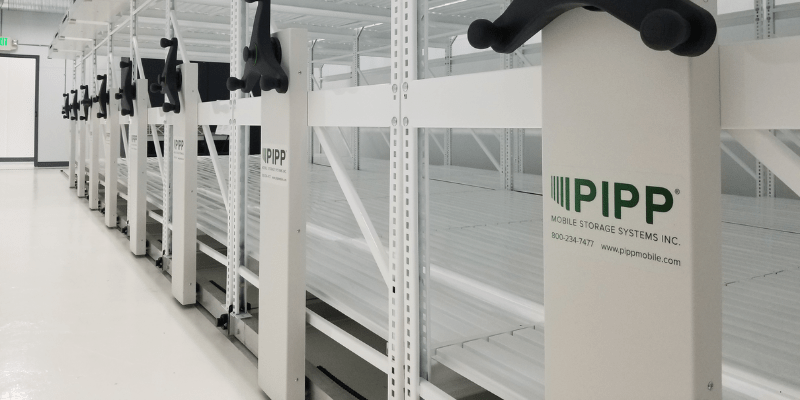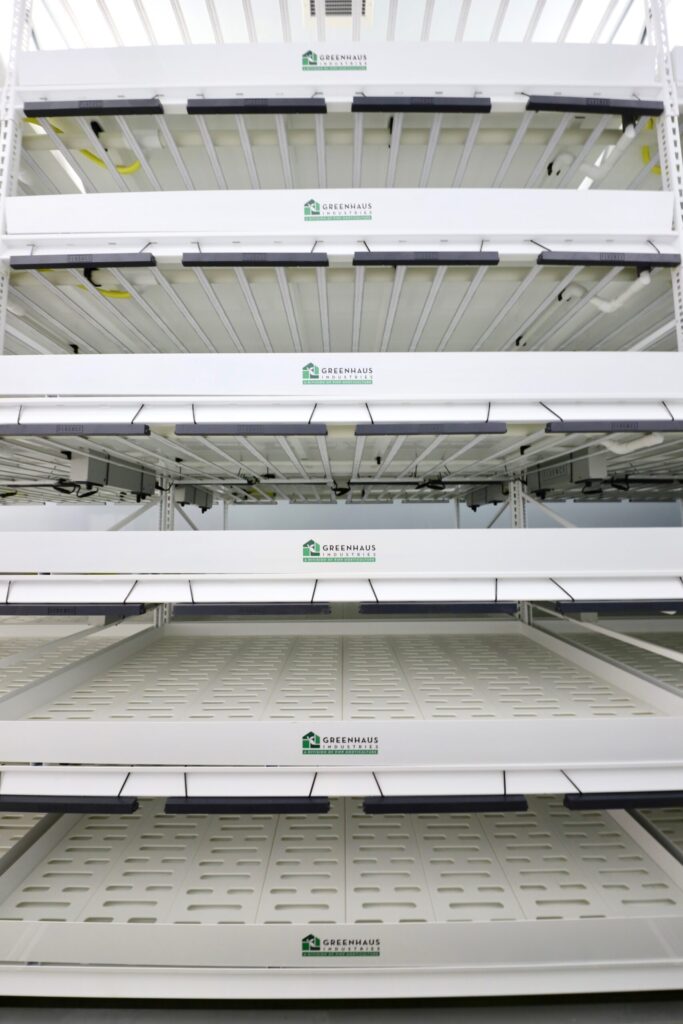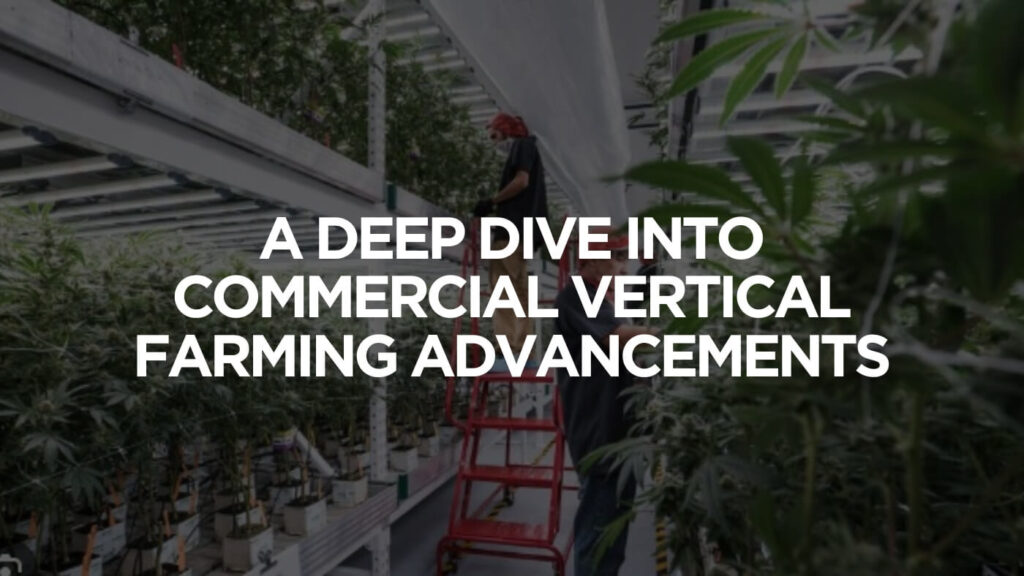Growing at an unexceptional pace, the cannabis industry has offered a vast opportunity for anyone seeking to thrive in this sector. However, this very exceptional growth makes it challenging for businesses to stand out, particularly with so many new techniques and regulations shifting the face of the market each second.
This is where the skill and expertise of a professional can be of great aid. Professionals like cannabis consultants stand at the forefront of the industry, guiding enterprises toward success. In fact, cannabis consultants like those at Catalyst BC can prove very helpful with subjects like vertical farming.
Vertical farming is a new and game-changing approach that helps maximize resources and space to achieve sustainable and high-yield crop production. In this post, we‘ll delve deep into this new and fascinating technique, examine the unique challenges and considerations faced by cultivators adopting this method, and how Catalyst BC’s vertical farming consultants can help overcome them.
Cannabis Industry – What You Need To Know
Cannabis has been a dear friend to humankind throughout history. Once seen as a religious and cultural symbol, this amazing plant has evolved to become a natural alternative for many medical conditions.
Over the past few years, the increase in scientific studies have led to shifts in legitimate rules and a widespread acceptance and understanding of the effects and features of this plant.
While just a few decades ago cannabis was deemed as a harmful and intoxicating drug, nowadays consumers appreciate the true extent of cannabis‘s capabilities and the many possibilities and advantages it brings to different industries.
The Rise Of Medicinal Cannabis
Probably the main reason behind the surge in the cannabis industry is the growing awareness surrounding the medicinal potential of cannabinoids.
Thanks to the advancement in science and technology, scientists have been able to isolate different compounds such as THC and CBD and uncover their therapeutic benefits. Now customers have access to a wide range of medical cannabis products made with different cannabinoids at different doses to address various conditions.
From managing chronic pain, epilepsy, and multiple sclerosis to addressing anxiety, insomnia, and PTSD, the applications of cannabis in medicine are proving to be revolutionary.
Embracing Recreational Use
While today medical cannabis is widely accepted and legalized in many regions including the U.S., the recreational use of cannabis has not yet received the same attitude.
That said, several countries are starting to embrace recreational cannabis as well, including Canada and Uruguay. With the recognition of adult consumers\’ rights and preferences, these regulated markets have offered a safe and legal avenue to enjoy the psychoactive experience of this plant.
Needless to say that this legalization brings economic growth, cannabis tourism, and immense tax revenues benefiting the local economy.
A World Of Innovation
A growing industry equals diverse and innovative products, creating a world of ancillary businesses and services.
With advanced technologies and cutting-edge methods, such as vertical farming, precise lighting systems, and sophisticated data analytics, businesses can increase the variety of their products and cater to diverse consumer preferences.
From tasty and healthy edibles such as vegan gummies to fat-acting and efficient vapes, the cannabis market is now ready to meet the demands of different target audiences.
Regulatory Challenges
As mentioned before, there has been great progress in the legal landscape surrounding cannabis. However, this has come with its fair share of challenges.
Depending on different jurisdictions, there are varying degrees of legalization and compliance requirements that businesses must comply with. This includes license acquisition, cultivation standards, advertising restrictions, and limited access to banking services.
This makes it daunting for businesses to navigate this landscape and ensure the legitimacy and sustainability of their operations.
What Is Vertical Farming?
Cultivation is a fundamental sector of the cannabis industry, delivering the foundation of high-quality cannabis products. Growing quality corps, however, is a delicate task, requiring knowledge, and experience, and utilizing various strategies and approaches.
Vertical farming is one such strategy that has been used in other industries for quite some time. The food industry, for instance, has been taking advantage of this method to cultivate more efficient products.
There are two main types of vertical farming, true vertical, and stacked vertical. Both of these methods offer unique advantages that make them a potential solution to the challenges of traditional farming.
Stacked Vertical
Stacked vertical farming involves cultivating crops in stacked tablets on top of each other with each stack having its artificial lighting, climate control systems, and hydroponic or aeroponic cultivation methods.
True Vertical
True vertical is the more advanced approach to vertical farming, requiring specialized expertise and high investment. In this method, cultivators use single long vertical PVC pipes called “canvas” to grow cannabis on the side of the column. This allows operations to further enhance their efficiency, and grow more plants per square foot.
What Are The Advantages Of Vertical Farms?
As with any other farming technique, these two methods have their own sets of pros and cons. With the guidance of a vertical farming consultant, businesses can analyze the specific requirements of their operation and choose the one that best aligns with their goals, and offer sustainability and growth.
Here we go through some of the key aspects and benefits of vertical farming in general:
Space Optimization
Establishing a cannabis cultivation business can be highly expensive, making it necessary to use every inch to maximize profitability. To do so, vertical farming can be a suitable method (and consulting expert advice from Catalyst BC specialists can only boost results.)
This strategy allows to optimize space and produce significantly higher yields per square meter of cultivation area. By using high-capacity tablets cultivators can grow plants within a smaller footprint compared to traditional horizontal farming methods.
Resource Efficiency
Water conversation and nutritionist efficiency are crucial aspects in the cultivation of cannabis plants. In many regions, particularly those located in deserts, reducing water consumption offers a competitive edge to enterprises.
Combining vertical farming systems with hydroponic or aeroponic methods allows farmers to deliver precise amounts of water and nutrients directly to the plant roots, minimizing waste.
Moreover, depending on the business, the vertical farming consultant may also suggest utilizing recirculating systems. This system captures and reuses water, ensuring to get the most out of our resources.
Ecosystem Control
The environment is an essential factor for growing quality plants. By offering climate control and providing optimal conditions, Catalyst BC’s vertical farming specialists ensure high-yield crops throughout the year.
Using this method, cultivators can create a wide range of strains with desirable properties regardless of the external conditions. Entrepreneurs can also use vertical farming consultants‘ expertise on the best temperature, humidity, lighting, and CO2 levels, to further regulate ideal conditions for maximum productivity.
Pest And Disease Management
The highly controlled and protected environments of vertical farming shelves minimize the risk of pests and diseases. As a result, this reduces the use of chemical pesticides and herbicides, leading to cleaner and safer final products.
Moreover, in this method, cultivators can keep out external pests to reduce the risk of contamination.
Consultants for Vertical Farming Industry
There‘s no doubt that vertical farming is a highly effective cultivation method. Although it’s a cost-effective approach in the long term, it requires large amounts of initial investment. Thus, it\’s essential to implement it correctly to achieve optimal results and reduce extra costs.
With experience and knowledge of various farming methods and systems, cannabis experts including vertical farming consultants help optimize operations and achieve long-term success.
But What Is A Cannabis Consultant?
In short, a cannabis consultant is an expert who possesses a deep knowledge of different aspects of the cannabis industry. They can offer valuable insights and advice and help you navigate the industry confidently.
Expertise In Cultivation Techniques
A vertical farming consultant can offer valuable insights regarding different Types Of Cannabis Business Strategies. This, coupled with a comprehensive knowledge of cannabis strains’ characteristics and requirements, allows them to tailor cultivation practices and enhance cannabinoid and terpene production.
These professionals help improve the cultivation process with hands-on experience in optimizing lighting, nutrient delivery, irrigation, and environmental control, which results in higher yields, potency, and overall quality.
Designing And Implementing Farming Systems
Careful planning, design, and execution are essential to the successful implementation of a vertical farming system. With expertise in this sector, vertical farming consultants consider factors such as lighting systems, air circulation, and humidity control, and offer optimal methods to design and set up the cultivation facility.
By leveraging their knowledge of best practices and industry standards, they ensure the efficient use of space, resources, and energy within the facility.
Crop Selection And Strain Optimization
The diversity of products is a key factor for thriving in the competitive cannabis market. Vertical cannabis consultants analyze the market demands, desired cannabinoid profiles, terpene profiles, and growth characteristics, and use this information to guide businesses in selecting suitable strains for their specific market.
This helps enterprises increase revenue by enhancing the quality and marketability of the produce while establishing themselves as a reliable supplier.
Climate Control And Environmental Monitoring
One of the main concerns in cultivation businesses is climate control. Cultivators must monitor various factors including temperature, humidity, and air circulation to ensure the optimal growing pace.
In vertical farming, this is even more important as there is an additional use of space. Vertical farming consultants ensure the correct implementation of climate control systems and monitor environmental parameters to optimize plant growth and development.
How To Start Vertical Farming?
As the cannabis market continues to expand, operations need to use new techniques to grow and elevate their businesses. And when it comes to cultivation, vertical farming is literally pushing the boundaries.
That said, this method requires thorough planning, and a full grasp of its intricacies to ensure a smooth and successful transition. Here are the essential steps to get started with vertical farming:
Define Goals And Create A Plan
As discussed above, there are different approaches to vertical farming. Therefore, it\’s important, to begin with a thorough plan considering the target market, the type of corps, financial restraints, and the scale of operation.
By doing so, business owners can minimize the occurrence of obstacles and make more informed decisions for an effective vertical farming venture.
Obtain The Necessary Permits And Licences
Due to the complex regulatory landscape of the cannabis industry, businesses must prioritize obtaining licenses and permits. Understanding and complying with regulations such as New Jersey Social Lounges helps avoid future issues and ensure a lawful operation.
Vertical farming consultants can contact the authorities and help get the permits required in that region. This typically includes zoning permits, farming permits, water usage permits, and more.
Choose The Right Cannabis Strain
Cannabis strains have different characteristics and requirements that need to be taken into account when implementing the vertical farming system.
In general, Indica strains are more appropriate for this method since Sativa grew taller. While this may not be problematic at the first stages of growth, it can interrupt the growth, and even ruin the plants as they progress through growth phases.
Set Up Infrastructure
With licenses and farming plans ready, it\’s time to install the necessary infrastructure. Environmental parameters have vital effects on the growth of cannabis plants, making it crucial to invest in quality and efficient LED lighting systems.
While many traditional farms use HPS lighting, LED lights provide the right spectrum, and intensity, and have less light burns risk.
Select Growing Medium And Nutrient Strategies
Depending on the strains, and the desired results, businesses should choose and implement the growing technique and nutrient strategy that aligns with their specific requirements.
In this step, vertical farming consultants can offer guidance on sustainable and well-managed nutrient delivery, ensuring plant health and avoiding nutrient imbalances and deficiencies.
Train And Hire Knowledgable Staff
Vertical farming is an intricate approach to cannabis cultivation that requires a well-trained team to handle its challenges. That\’s why operations must train their staff to manage the requirements and obstacles associated with this method.
A skilled team can help the business to achieve its full potential and achieve long-term goals.
Tips To Improve Your Vertical Farming System
Like any cultivation method, efficient implementation of vertical farming needs time and patience. Thus, it\’s best, to begin with a small system and grow strains with few leaves.
Although most strains can grow effectively in this method, it\’s best to incorporate Sativa strains only when fully experienced. For further control, cultivators can take advantage of STEM cultivation to collect data on the ecosystem and ensure the perfect condition for plant growth.
Final Words
The cannabis market is a growing sector with a large consumer base. To meet the demands of this market, vertical farming can be an effective approach that enhances the efficiency of cannabis cultivation. By optimizing space and resources, this method offers a cost-effective and profitable approach to farming.
That said, to ensure a successful vertical system, operations must have expertise and knowledge on different aspects of this method, different strains, and regulations.
Partnering with vertical cannabis consultants can be a valuable asset for businesses who wish to take advantage of this innovative method. These experts offer valuable guidance on design optimization, crop selection, cultivation techniques, and operational efficiency.
This knowledge and experience can help streamline the process, mitigate risks, and maximize the potential for success.
With years of experience in the cannabis industry, catalyst BC experts offer expertise in various sectors including cultivation. Whether you are a seasoned cultivator considering shifting to vertical farming, or an aspiring entrepreneur entering the cannabis world, we are here to help you build a successful future.
So Don\’t Get Left Behind: Get Your New York Cannabis License! Contact our team, and we will help you pave the way toward a successful business.
Vertical Farming Consultant FAQ
What does vertical farming refer to in the cannabis context?
Vertical farming is an agricultural technique used to achieve high yields in smaller indoor spaces. This method has recently entered the cannabis industry as well, allowing cultivators to maximize their products with fewer resources. In vertical farming, cannabis plants are grown on vertically stacked shelves within a controlled environment. This method, however, may not be suitable for all strains including those that grew taller.
What is the role of a vertical farming consultant?
In general cannabis consultants encompass deep knowledge and experience in various sectors of the industry, helping operations to navigate various challenges and achieve success. A vertical farming consultant, in particular, offers expertise, advice, guidance, and support to operations who consider starting or optimizing a vertical farming system. This includes helping design the farm system, selecting the strain, choosing cultivation techniques, monitoring environmental factors, managing nutrients, and more.
What are the cons of vertical farming?
Vertical farming is a game-changing technique that offers numerous advantages. However, there are several challenges to consider when implementing this method including the high initial investment. Setting up a vertical farming system requires significant resources for infrastructure, technology, lighting systems, climate controls, and other necessary equipment. Additionally, implementing it efficiently and effectively requires a solid understanding of complex systems and experience that not everyone has.
How does a vertical farming consultant address challenges and ensure success?
With a thorough understanding of the potential challenges in vertical farming, consultants can help identify issues in the first stages, and ensure the efficacy of the system. They provide insights, recommend best practices, and help implement robust strategies to ensure smooth operation and long-term success. Thanks to their expertise and ongoing support, operations can navigate complexities and optimize their farming practices.




